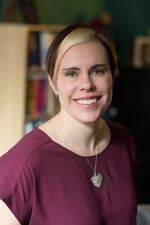

Main navigation | Main content

Department of Chemistry Professor Erin Carlson is one 105 researchers named by President Barack Obama as a recipient of the Presidential Early Career Awards for Scientists and Engineers (PECASE).
This is the government’s highest award given to early career scientists for their leadership and pursuit of innovative research at the frontiers of science and technology and for their commitment to community service demonstrated through scientific leadership, public education, and/or community outreach.
Carlson was nominated for this award by the National Science Foundation for her discovery of novel chemistry underlying a new approach to treat antibiotic-resistant infections, for leadership in the chemistry and women-chemists communities, and for developing new hands-on laboratory activities to engage K-12 students in natural product chemistry.
Concerned about the dramatic increase in drug-resistant bacteria, Carlson’s research unites tools from chemistry and biology to promote discovery of the master regulators of bacterial growth and communication, and ultimately, the identification of new antibiotics that possess both potency and long-term efficacy. She is working to identify strategies that lead to the development of antibiotics that will inhibit or slow the evolution of resistance.
Her research group is pursuing three complementary directions: 1) design and application of chemical probes for characterization of the cellular targets of existing antibacterial agents; 2) generation of methods for the investigation and inhibition of proteins involved in bacterial growth, virulence and antibiotic resistance; and 3) development of strategies to dramatically expand our ability to explore natural product chemical space, with the goal of identifying privileged structures and novel antibacterial agents.
In addition to her own research initiatives, Carlson is one of the new principal investigators with the Center for Sustainable Nanotechnology (CSN), which is focused on evaluating the impact of nanotechnology on the environment and biosphere. With expertise in molecular synthesis and mass spectrometry, Carlson brings tools and techniques that are helping the CSN team to investigate and control molecular-level chemical and biological interactions with nanoparticles.
Carlson is an excellent educator, serving on the faculty of the Departments of Chemistry, Medicinal Chemistry, and Biochemistry, Molecular Biology and Biophysics and in the Biomedical Informatics and Computational Biology graduate program.
When she first joined the faculty at the University of Minnesota less than two years ago, Carlson was asked to develop a chemical biology laboratory course—the first of its kind for the Department of Chemistry. With few examples of such courses across the nation, she spent nine months developing the curriculum. The goals of the course are to expose students to the application of modern chemical concepts and techniques to biological problems, and for students to understand how chemistry and biology are related, and why this interdisciplinary focus is important to the study of human biology and therapeutic development.
Carlson has also developed a program called, “Natural Products and Lighting the Fire of Curiosity” to introduce children of all ages to natural products. From the colors of flowers and the smell of citrus to the agents used as drugs, natural products provide the ideal model with which to ignite an interest in chemistry as these molecules perform functions that students can recognize and relate to.
Carlson also contributes to the chemistry profession. In 2014, she was elected Councilor of the American Chemical Society (ACS) Division of Biological Chemistry, helping to set policies for this national professional society that directly affect the Biological Division constituency, and acting as the voice of the national ACS to her constituency about the greater needs of the ACS as a whole.
Carlson received her bachelor's degree in chemistry from St. Olaf College in 2000 and a doctorate in organic chemistry from the University of Wisconsin-Madison in 2005. After postdoctoral studies at The Scripps Research Institute (2006-2008), she started her independent career as an assistant professor of chemistry at Indiana University in 2008. Carlson joined the faculty at the University of Minnesota as an associate professor in the summer of 2014.
Carlson is an award-winning scientist, honored as a Pew Biomedical Scholar, recipient of the National Institute of Health Director’s New Innovator Award, a National Science Foundation CAREER Award and the Cottrell Scholar Award. She was also named a Sloan Research Fellow.
Carlson will receive the Presidential Early Career Awards for Scientists and Engineers at a ceremony in Washington, D.C. this spring.